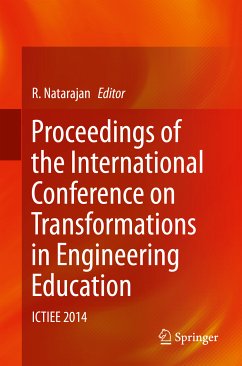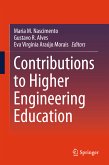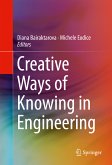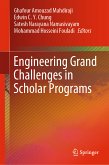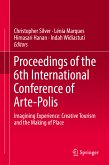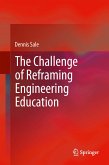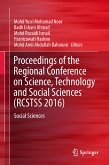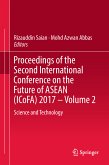Proceedings of the International Conference on Transformations in Engineering Education (eBook, PDF)
ICTIEE 2014
Redaktion: Natarajan, R.
113,95 €
113,95 €
inkl. MwSt.
Sofort per Download lieferbar

57 °P sammeln
113,95 €
Als Download kaufen

113,95 €
inkl. MwSt.
Sofort per Download lieferbar

57 °P sammeln
Jetzt verschenken
Alle Infos zum eBook verschenken
113,95 €
inkl. MwSt.
Sofort per Download lieferbar
Alle Infos zum eBook verschenken

57 °P sammeln
Proceedings of the International Conference on Transformations in Engineering Education (eBook, PDF)
ICTIEE 2014
Redaktion: Natarajan, R.
- Format: PDF
- Merkliste
- Auf die Merkliste
- Bewerten Bewerten
- Teilen
- Produkt teilen
- Produkterinnerung
- Produkterinnerung

Bitte loggen Sie sich zunächst in Ihr Kundenkonto ein oder registrieren Sie sich bei
bücher.de, um das eBook-Abo tolino select nutzen zu können.
Hier können Sie sich einloggen
Hier können Sie sich einloggen
Sie sind bereits eingeloggt. Klicken Sie auf 2. tolino select Abo, um fortzufahren.

Bitte loggen Sie sich zunächst in Ihr Kundenkonto ein oder registrieren Sie sich bei bücher.de, um das eBook-Abo tolino select nutzen zu können.
This book comprises the proceedings of the International Conference on Transformations in Engineering Education conducted jointly by BVB College of Engineering & Technology, Hubli, India and Indo US Collaboration for Engineering Education (IUCEE). This event is done in collaboration with International Federation of Engineering Education Societies (IFEES), American Society for Engineering Education (ASEE) and Global Engineering Deans' Council (GEDC). The conference is about showcasing the transformational practices in Engineering Education space.
- Geräte: PC
- ohne Kopierschutz
- eBook Hilfe
- Größe: 20.46MB
Andere Kunden interessierten sich auch für
![Contributions to Higher Engineering Education (eBook, PDF) Contributions to Higher Engineering Education (eBook, PDF)]() Contributions to Higher Engineering Education (eBook, PDF)81,95 €
Contributions to Higher Engineering Education (eBook, PDF)81,95 €![Creative Ways of Knowing in Engineering (eBook, PDF) Creative Ways of Knowing in Engineering (eBook, PDF)]() Creative Ways of Knowing in Engineering (eBook, PDF)89,95 €
Creative Ways of Knowing in Engineering (eBook, PDF)89,95 €![Engineering Grand Challenges in Scholar Programs (eBook, PDF) Engineering Grand Challenges in Scholar Programs (eBook, PDF)]() Engineering Grand Challenges in Scholar Programs (eBook, PDF)97,95 €
Engineering Grand Challenges in Scholar Programs (eBook, PDF)97,95 €![Proceedings of the 6th International Conference of Arte-Polis (eBook, PDF) Proceedings of the 6th International Conference of Arte-Polis (eBook, PDF)]() Proceedings of the 6th International Conference of Arte-Polis (eBook, PDF)161,95 €
Proceedings of the 6th International Conference of Arte-Polis (eBook, PDF)161,95 €![The Challenge of Reframing Engineering Education (eBook, PDF) The Challenge of Reframing Engineering Education (eBook, PDF)]() Dennis SaleThe Challenge of Reframing Engineering Education (eBook, PDF)73,95 €
Dennis SaleThe Challenge of Reframing Engineering Education (eBook, PDF)73,95 €![Proceedings of the Regional Conference on Science, Technology and Social Sciences (RCSTSS 2016) (eBook, PDF) Proceedings of the Regional Conference on Science, Technology and Social Sciences (RCSTSS 2016) (eBook, PDF)]() Proceedings of the Regional Conference on Science, Technology and Social Sciences (RCSTSS 2016) (eBook, PDF)113,95 €
Proceedings of the Regional Conference on Science, Technology and Social Sciences (RCSTSS 2016) (eBook, PDF)113,95 €![Proceedings of the Second International Conference on the Future of ASEAN (ICoFA) 2017 - Volume 2 (eBook, PDF) Proceedings of the Second International Conference on the Future of ASEAN (ICoFA) 2017 - Volume 2 (eBook, PDF)]() Proceedings of the Second International Conference on the Future of ASEAN (ICoFA) 2017 - Volume 2 (eBook, PDF)274,95 €
Proceedings of the Second International Conference on the Future of ASEAN (ICoFA) 2017 - Volume 2 (eBook, PDF)274,95 €-
-
-
This book comprises the proceedings of the International Conference on Transformations in Engineering Education conducted jointly by BVB College of Engineering & Technology, Hubli, India and Indo US Collaboration for Engineering Education (IUCEE). This event is done in collaboration with International Federation of Engineering Education Societies (IFEES), American Society for Engineering Education (ASEE) and Global Engineering Deans' Council (GEDC). The conference is about showcasing the transformational practices in Engineering Education space.
Dieser Download kann aus rechtlichen Gründen nur mit Rechnungsadresse in A, B, BG, CY, CZ, D, DK, EW, E, FIN, F, GR, HR, H, IRL, I, LT, L, LR, M, NL, PL, P, R, S, SLO, SK ausgeliefert werden.
Produktdetails
- Produktdetails
- Verlag: Springer India
- Seitenzahl: 641
- Erscheinungstermin: 22. Oktober 2014
- Englisch
- ISBN-13: 9788132219316
- Artikelnr.: 43796200
- Verlag: Springer India
- Seitenzahl: 641
- Erscheinungstermin: 22. Oktober 2014
- Englisch
- ISBN-13: 9788132219316
- Artikelnr.: 43796200
- Herstellerkennzeichnung Die Herstellerinformationen sind derzeit nicht verfügbar.
Editor R. Natarajan received his ME degree from the Indian Institute of Science, Bangalore; and his MASc and PhD degrees from the University of Waterloo, Canada. He has worked as a National Research Council Fellow in Canada, and as a Humboldt Research Fellow in Germany. He served as Director of the Indian Institute of Technology, Madras from 1995 to 2001 and as the Chairman of the All India Council for Technical Education, a statutory body of the Government of India, from 2001 to 2004. He was the Vice President of The Indian National Academy of Engineering during 2002-2006, and the Chairman of the Research Council of the Central Fuel Research Institute, Dhanbad during 1995-2005. He is currently the Chairman of the Board for IT Education Standards of Karnataka. He is a Fellow of Indian National Academy of Engineering, Indian Society for Technical Education, National Academy of Social Sciences, and Institution of Engineers (India). He has been conferred Honorary Doctorate Degrees by University of South Australia, Jawaharlal Nehru Technological University, Kanpur University, Nagarjuna University, Purvanchal University (U.P.) and NIT, Agartala. He has been a Member of the Editorial Boards of many prestigious journals including Fuel, Fuel Science and Technology, and Indian Journal of Technical Education. He is currently on the Editorial Board of the Journal of Engineering Education, published by the American Society for Engineering Education (ASEE). Co-editors Krishna Vedula is Professor of Chemical Engineering and Dean Emeritus, Francis College of Engineering, University of Massachusetts, Lowell. Dr. Vedula is currently founder and executive director of the Indo-US Collaboration for Engineering Education (IUCEE) facilitated initially by ASEE. IUCEE has the objective of improving quality and global relevance of engineering education in India and US. For the past five years, IUCEE has facilitated interactions between several hundreds of US faculty and several thousands of Indian faculty. He has also been the President of International Federation of Engineering Education Societies (IFEES) from 2010 to 2012. Dr. Vedula is well recognized globally for his contributions to engineering education, research, administration, and outreach. He is internationally recognized for his research in processing and properties of materials for high temperature applications, with particular emphasis on powder processing and inter-metallic compounds. He has been made a Fellow of American Society for Metals (ASM) and a Fellow of the American Society for Engineering Education (ASEE) in recognition of these professional achievements. As dean of engineering at University of Massachusetts (1995-2003), he has demonstrated his leadership in building unique partnerships with businesses, K-12, state agencies, and other educational institutions. He was responsible for raising several millions of dollars for scholarships, endowments and facilities from private sources and for overseeing a significant improvement in the quality of students and faculty as well research and teaching facilities at the Francis College of Engineering. He is Founder of "Massachusetts STEM (Science Technology Engineering and Mathematics) Collaborative" aimed at increasing the number of students in the state interested in pursuing science and engineering. This has now evolved into a program of the State of Massachusetts. Dr. Vedula has B.Tech (IIT Bombay, 1967), M.S. (Drexel University, 1969) and Ph.D. (Michigan Tech University, 1980) degrees in Materials Engineering. He has 30 years of academic teaching and research experience in materials science and engineering as well as engineering administration, including 10 years as a faculty member at Case Western Reserve University, 5 years as chair of the materials science and engineering department at Iowa State University, and 8 years as dean of an engineering college at UMass Lowell. Inaddition he has spent 2 years managing federal research and educational programs. Ashok S. Shettar earned his PhD from the Indian Institute of Science, Bangalore (India). He has three decades of experience in Engineering Education. His conviction and systemic practice of OBE have taken his Institution to greater heights in India. He has the experience of acting as resource person in workshops on outcome-based education in local, regional and national levels in India. He is an active researcher in Engineering Education. Dr. Ashok Shettar is currently the Principal of BVB College of Engineering & Technology, Hubli, India.
INVITED PAPERS: Panel Discussion: Transformations in Engineering Education Globally.- The Important Tool for the Transformation in Global Engineering Education - Mobility.- Adopting MOOCs for Quality Engineering Education in India.- Outcomes-Based Accreditation and ABET.- Present Status and Challenges Ahead for Engineering Education - Global and National Perspectives.- Innovation & Entrepreneurship in Engineering Education.- Attributes of Engineers and Engineering Education for the 21st Century World.- Engineers without Borders.- Pedagogy Training and Certification for Faculty.- Transforming Engineering Education: The Role of Engineering Educators in Making Meaningful Change.- ORAL PAPERS: Application Based Approach of Teaching Digital Signal Processing to a large Class in the Context of an Affiliated System.- Keyword Based Search and Ranking in NPTEL Lecture Videos.- Mini Projects - A New Concept of Transformation of Teaching-Learning Process.- Success Story of Industry Institution Collaboration for Enhancing Teaching Learning Experience.- Overlapped Concepts Pedagogy for Advanced Computer Architecture.- Learning made Easy-by LABVIEW Software tool.- Contemporary Access to Engineering Education and Research Using Interactive Knowledge and Modeling Techniques.- Puzzle Based Learning: A Joyful Learning Strategy in Automotive Engineering Education.- Improving Class Room Dynamics through Teaching Learning (academic) Audit.- IT Education and Team Based Learning.- Academic Information Management System Using Open Source Programming Tools and Technologies.- Designing Curriculum of IT: A Journey.- Essential IT Skills to Learning Community for Industry Readiness.- Benefits of Cloud Computing in Education during Disaster.- Technology Enhanced Learning through ICT Tools Using Aakash Tablet.- Impact of IUCEE on Institutional Performance: A Case Study of Rajarambapu Institute of Technology.- Green Electronics Design: Curriculum, Content andLearning for Engineering.- Should we have Compulsory "Engineering Ethics" Course for Engineers? Why should it be?.- Tracking Lab Activity in Technical Education System: A Case-study at the Guru Nanak Institutions (India).- Curriculum Re-design in Higher Education Using QFD - A Case Study.- Evolution of Engineering Education in India.- "Millimeter Techniques for Kilometer Benefits" Creating Excitement in CAED Classroom.- Program Outcome Attainment through Course Outcomes: A Comprehensive Approach.- The Education Design Shop: A Case Study on Education Reform through Design Thinking.- Inquiry Based Guided Learning to Enhance Interest and Higher Order Thinking in Engineering Graduates: A Computing Education Perspective.- Measuring the Impact of Design Fixation on Indian Engineering Students.- PPP - A Paradigm for Online Education in Engineering Colleges.- Innovative Method of Teaching Digital Signal Processing Using Ubiquitous Learning Strategies.- Transforming Engineering Students into Industry Ready Professionals.- Impact Analysis of Students' Learning Styles in Effective Planning & Delivery of Courses - A Case Study of Data Mining Course.- WiMAX in Education: A Wireless Networking Lab Design.- Creating an Integrated Learning Experience within Curriculum Threads through Mini-Projects.- Experience of Using Felder-SOLOMAN Index of Learning Styles.- Teaching Reform through Model Building in Theory of Machine Course.- Application of Design of Experiments (DOE) in Course Project.- SUCC Tool Kit: An Activity in Data Structure laboratory.- Open End Activity (OEA): An Experience in Computer Graphics Laboratory.- Leveraging Technology in Outcome Based Education.- Multidisciplinary Approach to Product Design and Realization.- Contextual Integration of Industrial & Production Engineering Curriculum.- Automotive Electronics: Learning through Real-World Problem Based Case Studies.- Pedagogical Transformation in Heat and Mass Transfer Laboratory Course ofUndergraduate Mechanical Engineering Programme.- Enhanced Learning through Self Study Component in Engineering Education.- Mapping Graduate Attributes of NBA with the Program Outcomes of the ABET/OBE to Establish Consistency between the Two.- Integrated Experience: Through Project-Based Learning.- Problem Identification through Literature Survey: A Course Project Activity to Satisfy Accreditation Requirements.- Attainment of Professional Outcome by Active Learning Method.- A Case Study on Improving Students' Conceptual Understanding in Engineering Courses.- 21st Century Classroom Engineering - Designing Effective Learning Environments: A Conceptual Case Study.- Project Based Learning in Laboratories Using Open Source Technologies: Case Study of a Frugal Approach.- A Study on Methodology and Implementation of Flipped Classroom Teaching For Engineering Courses Curriculum Design and Instructional Practices for Experiential Learning.- POSTERS: Moving Towards Experiential Learning.- Smart Assessment of Program and Course Outcome with Students' Objectives.- Technology Enhanced Teaching Learning Using Palm Devices.- Transformation of Engineering Education Using Quality Circle Approach.- Personal Transformation from Teacher to a Learning Facilitator: A Case Study.- Strategic Planning for an Engineering Institute - A Case study of Rajarambapu Institute of Technology, Sakharale.- Prominent Assessment of Students Learning and Statistical Analysis of Quizzes.- Engineering Education and Employability: Our Commitment.- Application of Curriculum Innovation for Production Management Subject.- Soft Skill Training through Cooperative Learning: A Case Study.- BLOG Based Student Lab Assignment & Assessment.- Overview of Effective and Efficient Learning Model PBL - Project Based Learning.- A Global Knowledge Mining Hub - Technology Enhanced Learning.- Project Based Learning - An Enhanced Approach for Learning in Engineering.- An Effective Lab in Digital SignalProcessing.- Open Assessment Method for Better Understanding of Student's Learnability to Create Personalised Recommendations.- Learning Outcomes in Engineering Education: A Review of Experimentation at Walchand Institute of Technology, Solapur.- Overview of Accreditation System and Investigations of Assessment Methods/Techniques for Quality Assurance of Engineering Education.- The Institutional Leadership of JNTUK System in Embracing New Paradigms in Engineering Education.- Developing Effective Industry Partnerships to Pro-mote Learning and Entrepreneurship.- Role of Industry-Institute-Interaction to Promote Education and Entrepreneurship.- Technology: A Source of Supplement to the Teaching and the Process of Learning in Higher Education.- Indian Technical Teaching Service (ITTS) - A Proposal to Improve Quality of Engineering Education.- Electronic System Design, Manufacturing and Human Resource.- Efficient Teaching Aid: Self Learning Models.- Developing Innovation among Under-Graduate Students.- The Innovative Cloud-based Solution for Classroom Transformation.- Group - Assignment writing in Engineering: Some Preliminary findings.- IPython Notebook for Teaching and Learning.- A LabVIEW Based Laboratory Experience of Real Time Embedded Concepts.- A Framework for Curriculum Design of Data Structures and Design of Algorithms Course (DSDA).- Assessment of Program Outcome by Open-Ended Experiment in Enzyme Technology Laboratory Course.- Introduction of Chapter "How Stuff Works" and Course Seminar in Elements Of Mechanical Engineering.- Outcome based pedagogical approach for Energy conversion laboratory course of Mechanical Engineering UG Programme.- A Comprehensive Method For Defining and Assessing Programme Outcome - A Lifelong Learning Through Direct Assessment Techniques.- An Attempt to Bridge the Gap Between Industry and Academia - An Experience.- Effective Teaching of Digital Electronics for Undergraduate Students Using a Free Circuit SimulationSoftware-SEQUEL.- Theme Based Capstone Projects and Programme Outcome Evaluation: A Case Study.- Importance of Research at Undergraduate level.
INVITED PAPERS: Panel Discussion: Transformations in Engineering Education Globally.- The Important Tool for the Transformation in Global Engineering Education - Mobility.- Adopting MOOCs for Quality Engineering Education in India.- Outcomes-Based Accreditation and ABET.- Present Status and Challenges Ahead for Engineering Education - Global and National Perspectives.- Innovation & Entrepreneurship in Engineering Education.- Attributes of Engineers and Engineering Education for the 21st Century World.- Engineers without Borders.- Pedagogy Training and Certification for Faculty.- Transforming Engineering Education: The Role of Engineering Educators in Making Meaningful Change.- ORAL PAPERS: Application Based Approach of Teaching Digital Signal Processing to a large Class in the Context of an Affiliated System.- Keyword Based Search and Ranking in NPTEL Lecture Videos.- Mini Projects - A New Concept of Transformation of Teaching-Learning Process.- Success Story of Industry Institution Collaboration for Enhancing Teaching Learning Experience.- Overlapped Concepts Pedagogy for Advanced Computer Architecture.- Learning made Easy-by LABVIEW Software tool.- Contemporary Access to Engineering Education and Research Using Interactive Knowledge and Modeling Techniques.- Puzzle Based Learning: A Joyful Learning Strategy in Automotive Engineering Education.- Improving Class Room Dynamics through Teaching Learning (academic) Audit.- IT Education and Team Based Learning.- Academic Information Management System Using Open Source Programming Tools and Technologies.- Designing Curriculum of IT: A Journey.- Essential IT Skills to Learning Community for Industry Readiness.- Benefits of Cloud Computing in Education during Disaster.- Technology Enhanced Learning through ICT Tools Using Aakash Tablet.- Impact of IUCEE on Institutional Performance: A Case Study of Rajarambapu Institute of Technology.- Green Electronics Design: Curriculum, Content andLearning for Engineering.- Should we have Compulsory "Engineering Ethics" Course for Engineers? Why should it be?.- Tracking Lab Activity in Technical Education System: A Case-study at the Guru Nanak Institutions (India).- Curriculum Re-design in Higher Education Using QFD - A Case Study.- Evolution of Engineering Education in India.- "Millimeter Techniques for Kilometer Benefits" Creating Excitement in CAED Classroom.- Program Outcome Attainment through Course Outcomes: A Comprehensive Approach.- The Education Design Shop: A Case Study on Education Reform through Design Thinking.- Inquiry Based Guided Learning to Enhance Interest and Higher Order Thinking in Engineering Graduates: A Computing Education Perspective.- Measuring the Impact of Design Fixation on Indian Engineering Students.- PPP - A Paradigm for Online Education in Engineering Colleges.- Innovative Method of Teaching Digital Signal Processing Using Ubiquitous Learning Strategies.- Transforming Engineering Students into Industry Ready Professionals.- Impact Analysis of Students' Learning Styles in Effective Planning & Delivery of Courses - A Case Study of Data Mining Course.- WiMAX in Education: A Wireless Networking Lab Design.- Creating an Integrated Learning Experience within Curriculum Threads through Mini-Projects.- Experience of Using Felder-SOLOMAN Index of Learning Styles.- Teaching Reform through Model Building in Theory of Machine Course.- Application of Design of Experiments (DOE) in Course Project.- SUCC Tool Kit: An Activity in Data Structure laboratory.- Open End Activity (OEA): An Experience in Computer Graphics Laboratory.- Leveraging Technology in Outcome Based Education.- Multidisciplinary Approach to Product Design and Realization.- Contextual Integration of Industrial & Production Engineering Curriculum.- Automotive Electronics: Learning through Real-World Problem Based Case Studies.- Pedagogical Transformation in Heat and Mass Transfer Laboratory Course ofUndergraduate Mechanical Engineering Programme.- Enhanced Learning through Self Study Component in Engineering Education.- Mapping Graduate Attributes of NBA with the Program Outcomes of the ABET/OBE to Establish Consistency between the Two.- Integrated Experience: Through Project-Based Learning.- Problem Identification through Literature Survey: A Course Project Activity to Satisfy Accreditation Requirements.- Attainment of Professional Outcome by Active Learning Method.- A Case Study on Improving Students' Conceptual Understanding in Engineering Courses.- 21st Century Classroom Engineering - Designing Effective Learning Environments: A Conceptual Case Study.- Project Based Learning in Laboratories Using Open Source Technologies: Case Study of a Frugal Approach.- A Study on Methodology and Implementation of Flipped Classroom Teaching For Engineering Courses Curriculum Design and Instructional Practices for Experiential Learning.- POSTERS: Moving Towards Experiential Learning.- Smart Assessment of Program and Course Outcome with Students' Objectives.- Technology Enhanced Teaching Learning Using Palm Devices.- Transformation of Engineering Education Using Quality Circle Approach.- Personal Transformation from Teacher to a Learning Facilitator: A Case Study.- Strategic Planning for an Engineering Institute - A Case study of Rajarambapu Institute of Technology, Sakharale.- Prominent Assessment of Students Learning and Statistical Analysis of Quizzes.- Engineering Education and Employability: Our Commitment.- Application of Curriculum Innovation for Production Management Subject.- Soft Skill Training through Cooperative Learning: A Case Study.- BLOG Based Student Lab Assignment & Assessment.- Overview of Effective and Efficient Learning Model PBL - Project Based Learning.- A Global Knowledge Mining Hub - Technology Enhanced Learning.- Project Based Learning - An Enhanced Approach for Learning in Engineering.- An Effective Lab in Digital SignalProcessing.- Open Assessment Method for Better Understanding of Student's Learnability to Create Personalised Recommendations.- Learning Outcomes in Engineering Education: A Review of Experimentation at Walchand Institute of Technology, Solapur.- Overview of Accreditation System and Investigations of Assessment Methods/Techniques for Quality Assurance of Engineering Education.- The Institutional Leadership of JNTUK System in Embracing New Paradigms in Engineering Education.- Developing Effective Industry Partnerships to Pro-mote Learning and Entrepreneurship.- Role of Industry-Institute-Interaction to Promote Education and Entrepreneurship.- Technology: A Source of Supplement to the Teaching and the Process of Learning in Higher Education.- Indian Technical Teaching Service (ITTS) - A Proposal to Improve Quality of Engineering Education.- Electronic System Design, Manufacturing and Human Resource.- Efficient Teaching Aid: Self Learning Models.- Developing Innovation among Under-Graduate Students.- The Innovative Cloud-based Solution for Classroom Transformation.- Group - Assignment writing in Engineering: Some Preliminary findings.- IPython Notebook for Teaching and Learning.- A LabVIEW Based Laboratory Experience of Real Time Embedded Concepts.- A Framework for Curriculum Design of Data Structures and Design of Algorithms Course (DSDA).- Assessment of Program Outcome by Open-Ended Experiment in Enzyme Technology Laboratory Course.- Introduction of Chapter "How Stuff Works" and Course Seminar in Elements Of Mechanical Engineering.- Outcome based pedagogical approach for Energy conversion laboratory course of Mechanical Engineering UG Programme.- A Comprehensive Method For Defining and Assessing Programme Outcome - A Lifelong Learning Through Direct Assessment Techniques.- An Attempt to Bridge the Gap Between Industry and Academia - An Experience.- Effective Teaching of Digital Electronics for Undergraduate Students Using a Free Circuit SimulationSoftware-SEQUEL.- Theme Based Capstone Projects and Programme Outcome Evaluation: A Case Study.- Importance of Research at Undergraduate level.
